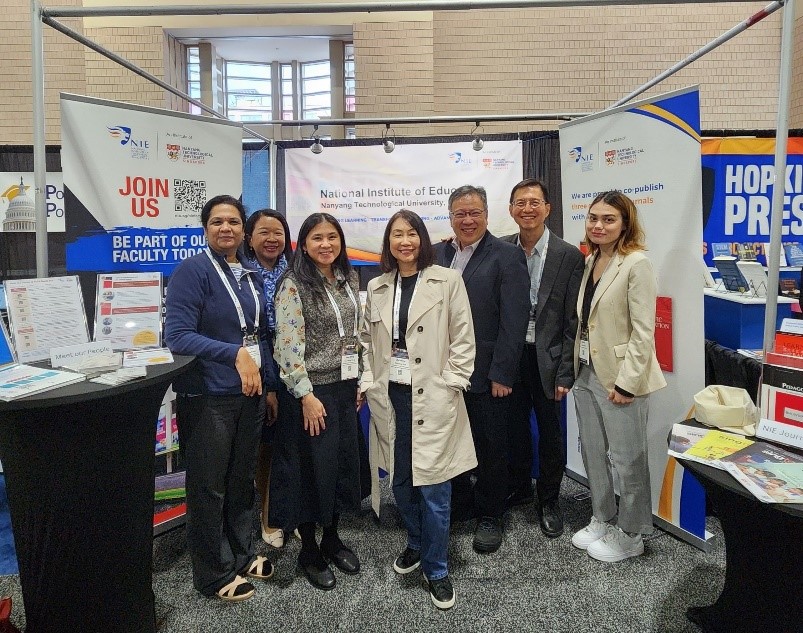NIE representatives participate in the American Educational Research Association (AERA) 2024
NIE representatives Dr Dennis Kwek, Centre Director of CRPP and Associate Dean of Strategic Engagement at the Office of Education Research, Ms Lorraine Ow, Unit Head of Knowledge Mobilisation (KMb) and co-lead of the Research Practice Policy Group (RPPG), and Ms Radiah Belak, Education Analyst at the Research Practice Policy Group (RPPG), participated in the American Educational Research Association (AERA) 2024 from 11 to 14 April 2024. Ms Ow and Ms Belak represented NIE and OER through the showcase of the education research conducted by NIE colleagues. As an annual international education research event, OER has been sending representatives in the past years to share about NIE journals at this event to develop special issues and encourage journal submissions. This year, the 4-day exhibition showcase expanded to other aspects of NIE's research including the research centres, book and other publications, Redesigning Pedagogy International Conference (RPIC) 2024, as well as networking opportunities with 11 NIE faculty who were rostered at the booth as NIE's ambassadors.
Dr Kwek and Ms Ow also presented a paper titled "What Makes Education Research Impactful: Mobilising Knowledge Through Research-Practice-Policy Partnership Configurations" on 14 April 2024 at the Research Use Special Interest Group session in Philadelphia. Their paper showcased the research impact and knowledge mobilisation efforts aligned to Etzkowitz’s (2008) “Triple Helix” of university-industry-government interaction, manifested in Singapore’s context as a research-practice-policy-partnership (RPPP) nexus. The qualitative study sought to contribute to the wider conversation by investigating the perceptions of research impact by researchers and research users, as well as the factors that contribute to the achievement of their perceived research impact.
Based on the responses of interviewees from eight government-funded research projects, both researchers and research users perceive the research findings as having an instrumental impact on policy and practice, though researchers also perceive conceptual impact in how their research informs the thinking and considerations of policymakers and practitioners. Factors observed to contribute to research impact are (1) relevance and timeliness to the system, (2) relationship building, (3) knowledge intermediary, and (4) continuous research engagement. The presentation showcased insights into the perceptions of impact by different actors in the system, which can cause the processes of achieving impact to be arduous even in a system like Singapore’s where an RPPP nexus exists.

















/enri-thumbnails/careeropportunities1f0caf1c-a12d-479c-be7c-3c04e085c617.tmb-mega-menu.jpg?Culture=en&sfvrsn=d7261e3b_1)

/cradle-thumbnails/research-capabilities1516d0ba63aa44f0b4ee77a8c05263b2.tmb-mega-menu.jpg?Culture=en&sfvrsn=1bc94f8_1)

7e6fdc03-9018-4d08-9a98-8a21acbc37ba.tmb-mega-menu.jpg?Culture=en&sfvrsn=7deaf618_1)




.tmb-listing.jpg?Culture=en&sfvrsn=2b123388_1)
.tmb-listing.jpg?Culture=en&sfvrsn=ffacb540_1)